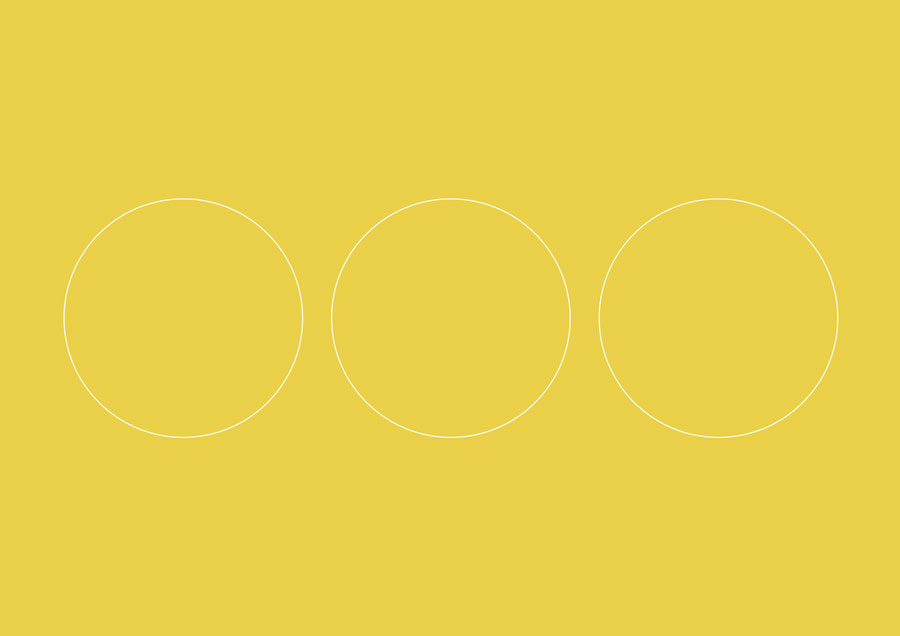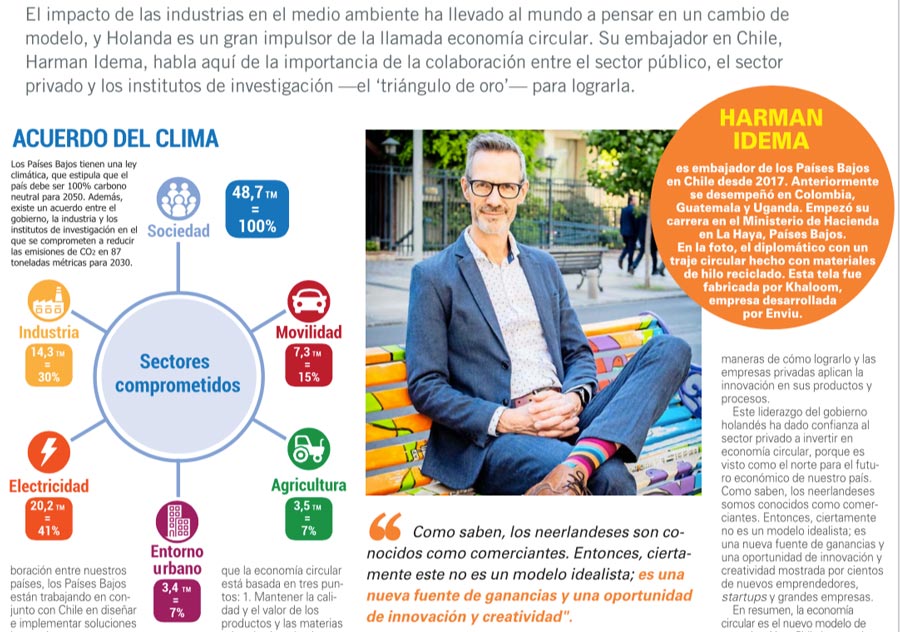The impact of industries on the environment has led the world to think about a change in model, and the Netherlands is a great driver of the so-called circular economy. The Dutch ambassador in Chile, Harman Idema, speaks here of the importance of collaboration between the public sector, the private sector and research institutes the `golden triangle’ to achieve it. The article is in Spanish and is published on El Mercurio, which can be read here: Circular Economy Chile:
We have translated the article into English which can be read below:
“Megadrought. Water crisis.Congestion. Pollution. These are related terms to the environmental challenges Chile experiences, which have been heard strongly during 2019. The geographical conditions of the country means you have to deal with a great variety of ecosystems and variables. With the drought, agriculture is moving from North to South in addition, the inefficient usage of water makes a good watershed management increasingly essential. In the cities, the infrastructure is under pressure for urbanization, causing congestion and 420 kilos of waste per inhabitant per year. At the international level, the Chilean economy depends heavily on its natural resources. Agriculture and mining are significant environmental footprint sectors, which needs and seek ways to reduce it, for example, through the efficient treatment of water. These are some challenges for Chile. But also many other countries, including the Netherlands, struggle with the same question of how to continue with economic models and lifestyles, and at the same time mitigate its impacts and adapt to the climate crisis. Environmental challenges interact with another challenge important: social inequality. The most vulnerable communities are affected disproportionately by the climate crisis. These communities have fewer resources for adaptation to the environmental crisis in the longterm. And it’s not only in the longterm that the crisis has consequences, there are also problems that are already present and that require an immediate answer. For example, it is complex for a vulnerable region like La Araucanía facing the increase in forest fires, as happened in February 2019.
HARMAN IDEMA.
He is Ambassador of the Netherlands in Chile since 2017. Previously he worked in Colombia, Guatemala and Uganda. Started his career in the Ministry of Finance in The Hague, the Netherlands.In the photo, the diplomat with a circular suit made with materials of recycled thread. This cloth was manufactured by Khaloom, company developed by Enviu.
Given the long history of collaboration between our countries, the Netherlands are working together with Chile to design and implement innovative and sustainable solutions. The circular economy could be one of them. It’s about a business model that sees the production and sales focused on sustainability. It is not an elegant synonym for ‘Recycle’; it’s a concept a lot broader in which recycling is one of the many ways of achieving it. In general, you can say that the circular economy is based on three points:
- Maintain the quality and value of the primary products and materials to the highest value possible.
- Replace fossil materials with raw premiums materials produced in a sustainable and renewable manner.
- Design new production methods and new products, and encourage changes in consumption towards sustainability.
The Netherlands has the objective to have a completely circular economy in 2050. This is only possible if there is a clear direction. In 2016 the government created the National Plan “Netherlands Circular in 2050 “, a vision of how the country can become a sustainable and circular economy, and that creates public policies to achieve it. This can only be achieved if there is close collaboration between the public sector, the private sector and research institutes, what we call the ‘golden triangle’. From this collaboration emerged the “Raw Materials Agreement” and agendas of transition for five key sectors. In practice, it means that the circular economy is driven by the government, the universities investigate ways of how to achieve it and the private companies apply the innovation in their products and processes. This governmental Dutch leadership has given confidence to private sector to invest in circular economy because it is seen as the direction for the future economy of our country.
As you know, the Dutch are known as merchants. So certainly it is not an idealistic model only; it is a new source of earnings and an opportunity for innovation and creativity shown by hundreds of new entrepreneurs, startups and big companies. In short, the circular economy is the new model of business. And in Chile there are many efforts that go into the same direction, including Corfo programs to push this change. I hope our two countries can inspire and collaborate in this innovative path and contribute also to new opportunities for Chileans companies and entrepreneurs towards a sustainable future in economic, environmental and social terms. ”
More information about The Waste Transformers, visit our website.
Do you want to follow us on social media, give us a page like on Facebook, Twitter and LinkedIn.
Curious how our installation works? Watch our short movie here.
Become a frontrunner in your industry

Hotels

Airports

Universities

Communities

More industries
Get in contact with us to learn more about the possibilities of using an installation on your site to generate value from waste.
> Return to other news


